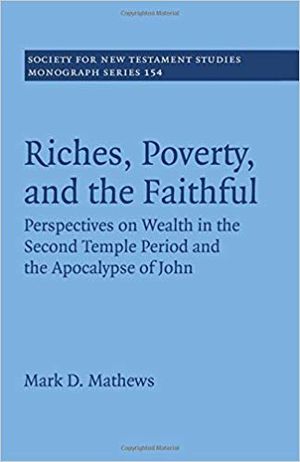Difference between revisions of "Riches, Poverty, and the Faithful: Perspectives on Wealth in the Second Temple Period and the Apocalypse of John (2013 Mathews), book"
| (4 intermediate revisions by the same user not shown) | |||
| Line 1: | Line 1: | ||
[[File:2013 Mathews.jpg|thumb|300px]] | |||
''' Riches, Poverty, and the Faithful: Perspectives on Wealth in the Second Temple Period and the Apocalypse of John''' (2013) is a book by [[Mark D. Mathews]]. | ''' Riches, Poverty, and the Faithful: Perspectives on Wealth in the Second Temple Period and the Apocalypse of John''' (2013) is a book by [[Mark D. Mathews]]. | ||
| Line 7: | Line 9: | ||
==Editions== | ==Editions== | ||
Published in [[Cambridge, England]]: [[Cambridge University Press]], 2013. | Published in [[Cambridge, England]]: [[Cambridge University Press]], 2013 ([[Society for New Testament Studies Monograph Series]], 154). | ||
== | ==Contents== | ||
Part I. Introduction. -- 1. The question of wealth in the Apocalypse -- part II. The language of wealth and poverty, rich and poor, in the Second Temple Period. -- Introduction ; 2. Dead Sea Scrolls: non-sectarian Aramaic documents ; 3. Dead Sea Scrolls: non-sectarian Hebrew documents ; 4. Dead Sea Scrolls: sectarian Hebrew documents ; 5. Other Jewish literature -- part III. Wealth, poverty, and the faithful community in the Apocalypse of John. -- Introduction ; 6. The language of wealth and poverty in the seven messages: Rev 2-3 ; 7. The present eschatological age: Rev 4-6 ; 8. Buying and selling in Satan's world: Rev 12-13, 18 ; 9. Conclusions. | Part I. Introduction. -- 1. The question of wealth in the Apocalypse -- part II. The language of wealth and poverty, rich and poor, in the Second Temple Period. -- Introduction ; 2. Dead Sea Scrolls: non-sectarian Aramaic documents ; 3. Dead Sea Scrolls: non-sectarian Hebrew documents ; 4. Dead Sea Scrolls: sectarian Hebrew documents ; 5. Other Jewish literature -- part III. Wealth, poverty, and the faithful community in the Apocalypse of John. -- Introduction ; 6. The language of wealth and poverty in the seven messages: Rev 2-3 ; 7. The present eschatological age: Rev 4-6 ; 8. Buying and selling in Satan's world: Rev 12-13, 18 ; 9. Conclusions. | ||
| Line 17: | Line 19: | ||
[[Category:2013| Mathews]] | [[Category:2013| Mathews]] | ||
[[Category: | [[Category:English language--2010s|2013 Mathews]] | ||
[[Category:Second Temple Studies--2010s|2013 Mathews]] | |||
[[Category:Second Temple Studies--English|2013 Mathews]] | |||
[[Category: | [[Category:Johannine Studies--2010s|2013 Mathews]] | ||
[[Category:Johannine Studies--English|2013 Mathews]] | |||
[[Category: | |||
[[Category: | [[Category:Apocalyptic Studies--2010s|2013 Mathews]] | ||
[[Category:Apocalyptic Studies--English|2013 Mathews]] | |||
[[Category: | |||
Latest revision as of 00:56, 1 August 2018
Riches, Poverty, and the Faithful: Perspectives on Wealth in the Second Temple Period and the Apocalypse of John (2013) is a book by Mark D. Mathews.
Abstract
"In the book of Revelation, John appeals to the faithful to avoid the temptations of wealth, which he connects with evil and disobedience within secular society. New Testament scholars have traditionally viewed his somewhat radical stance as a reaction to the social injustices and idolatry of the imperial Roman cults of the day. Mark D. Mathews argues that John's rejection of affluence was instead shaped by ideas in the Jewish literature of the Second Temple period which associated the rich with the wicked and viewed the poor as the righteous. Mathews explores how traditions preserved in the Epistle of Enoch and later Enochic texts played a formative role in shaping John's theological perspective. This book will be of interest to those researching poverty and wealth in early Christian communities and the relationship between the traditions preserved in the Dead Sea Scrolls and New Testament"--Publisher description.
Editions
Published in Cambridge, England: Cambridge University Press, 2013 (Society for New Testament Studies Monograph Series, 154).
Contents
Part I. Introduction. -- 1. The question of wealth in the Apocalypse -- part II. The language of wealth and poverty, rich and poor, in the Second Temple Period. -- Introduction ; 2. Dead Sea Scrolls: non-sectarian Aramaic documents ; 3. Dead Sea Scrolls: non-sectarian Hebrew documents ; 4. Dead Sea Scrolls: sectarian Hebrew documents ; 5. Other Jewish literature -- part III. Wealth, poverty, and the faithful community in the Apocalypse of John. -- Introduction ; 6. The language of wealth and poverty in the seven messages: Rev 2-3 ; 7. The present eschatological age: Rev 4-6 ; 8. Buying and selling in Satan's world: Rev 12-13, 18 ; 9. Conclusions.
